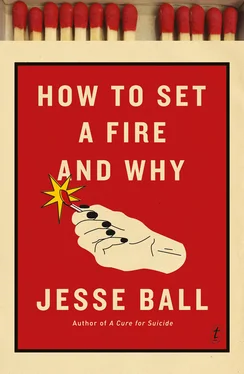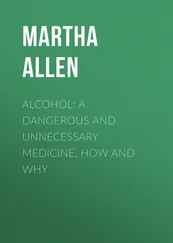Next day, I get off the bus by the house and there’s a police car there waiting for me.
What is it, officer?
(No reason not to be polite.)
Lucia Stanton?
They took me back to the precinct and asked me a whole bunch of questions. They showed me a picture of Jan and asked if I knew him. I said I couldn’t tell. The picture was bad. It could be anyone. They asked if I knew some other people, a guy named Lance, a girl named Willa.
I don’t know them. Do you?
I know who they are. Why do you think I’m asking you?
How did you get my name anyway?
Someone said you knew these people. Someone you know.
A lot of people think they know me.
I bring out the worst in people, but in this case, after a while, the cops and me, we got along. I can get along with anybody. They wanted to know who hit me, and I explained about getting high as fuck and going in the bouncy castle with my two cute girlfriends. They liked that quite a lot, maybe too much. They had me tell it twice and the second time one of them asked me what we were wearing. What do you mean? What were you wearing in the bouncy castle? Some of the other officers gave that guy a look and he shut up.
I didn’t even have to take the bus home, because one of them was going that way and gave me a ride home.
I felt like I had really tricked them, but when the officer let me out, he said,
Lev told me to tell you, friendly advice, it costs nothing: stay away from those people. You don’t know what they’re like.
This is you being a sweetheart, I said.
That’s right.
Sometimes events speed up. You think you have a handle on them. You think you understand how one thing follows another, but then it turns out you can’t even perceive what is about to happen, and before you know it, not only that, but other things too—they all have happened, and you’re standing in the rubble trying to figure out what to do.
I started wanting to go to school less and less. I was hanging out with Lana and her cousin and Jan more and more. I started to feel any request that was made on me was too much.
When people write books about childhood, and about being a kid—they always talk about how endless it is, and about how there is no thought of time. Everything just stretches and stretches. I think the opposite is the case. When you’re young, you feel like things are constantly ending. As soon as you get used to something, it goes away. There was an old couple who used to watch me when I was four or five, and I would go into their backyard. There was a low part and a high part as the yard rose up a hill, and on the high part, kind of a trail, I guess, there were flowers—just an endless path of flowers and white stones. I know that when I was there, when I was four and I was there on that path, I felt sure that life was almost over. I felt like most of it had already come and gone. I don’t think I even knew about death yet.
My aunt says that I am naturally curious. That means that I don’t need to be taught how to learn. Some people have a disadvantage at the beginning, and they are not curious. These people have trouble learning. It seems like not being curious is the worst thing of all. Curious people aren’t necessarily good at learning what you want them to learn, though. They are too busy learning about other things.
My aunt said to me, while we were sitting in the garden, let’s go into the house. So, we went into the house.
Then, we were in the house, and she said, let’s go back out to the garden, I was wrong.
So, we went back out into the garden.
There’s a thing I have to tell you, she said. I think this is it. I pretty much think this is it.
What do you mean?
I want us to go back inside in a bit and I will sit down in my chair, and you can sit near me. Maybe make some tea. I think this may be, I think it may be it.
I started crying, but with no sound. I could see she didn’t like it, so I got myself together and stopped. It was like trying to swallow something enormous, something made out of air, and I couldn’t do it, but then I did.
I helped her back inside, and got her into the chair. She started telling me a bunch of things she was sorry about, and how she wished that she was younger, how she even wished we could be the same age, because we matched up so well, and how she was proud of me, so proud, it was like I was her daughter. I said, stop it. She said, I will, I will.
I held her hand, and after a while gave her the tea. She held the cup for a second and then I took it back and put it on the ground by the chair.
Why don’t you put on a record, she said. Something quiet. I said okay, I’ll put on a record. I’ll go do that.
I found a record. I put it on.
I came back across the room, and behind me the record was just starting, behind me there was hissing and hissing and as the first few notes came, scratched out of the dark plastic by the needle, I looked for her in the chair where her body was, but I saw that she wasn’t there.

The Wentworth building stands at the end of a big avenue. You can see it from a mile away. Matter of fact, it’s like the hand of a clock, because when the sun is shining on some parts of town, other parts get nothing because they are in its shadow.
I decided I was done with people. Even good ones—they can’t do much for you.
Lana and I pretended to be going to some office, and we got to the roof of the Wentworth building. The elevator doesn’t even go all the way. The last five floors are these majestic stairs. I guess it was a place for captains of industry or some other hateful types. This beautiful staircase comes to a huge double door that is cobwebbed and dirty. I kicked at it and Lana rammed it. Then we saw there was another door on the side. We kicked at that, and kicked at it. It opened and we got out onto the roof.
The sudden expanse was—surprising. The thing about distance is, it feels complete. Maybe it is the opposite of complete, but it feels so finished in its endlessness.
We walked out toward the edge.
Wait.
I’m not afraid, I said.
Afraid of what? Wait up.
I walked right to it, as if I were walking on a sidewalk. I mean, my toes were hanging over. My body swayed forward, then back, then forward. I looked down, and I felt nothing.
Asshole, get back here.
No, you come over here.
I sat down with my legs hanging off. The roof was warm, real warm, and I could feel the warmth all through my legs. The breeze was stiff and cool, and it came now and then.
Lana crept to the edge and sat next to me.
You asshole.
We looked down over the town.
It is so hard, she said, to take it seriously. Matter of fact, I refuse to. Long as I live, I won’t take anything seriously. What do you say?
I said I would agree, for me and for my aunt, too.
Lana was quiet for a while.
She’s dead, isn’t she?
Yeah. How’d you know?
Your eyes are swollen. Was it yesterday?
Yeah.
Crazy old bat. I don’t want to live that long.
Me neither.
I want to die in the afternoon—when it’s just stopped raining and no one’s around.
How would you do it?
I would walk out into the middle of a public park, some beautifully trimmed lawn. People would be starting to leave their houses. From every direction they’d be coming toward me, but they wouldn’t be there yet. Because by the time they got there, they would find that I was dead. No matter when they did come, I would just be a corpse in a park.
Читать дальше













